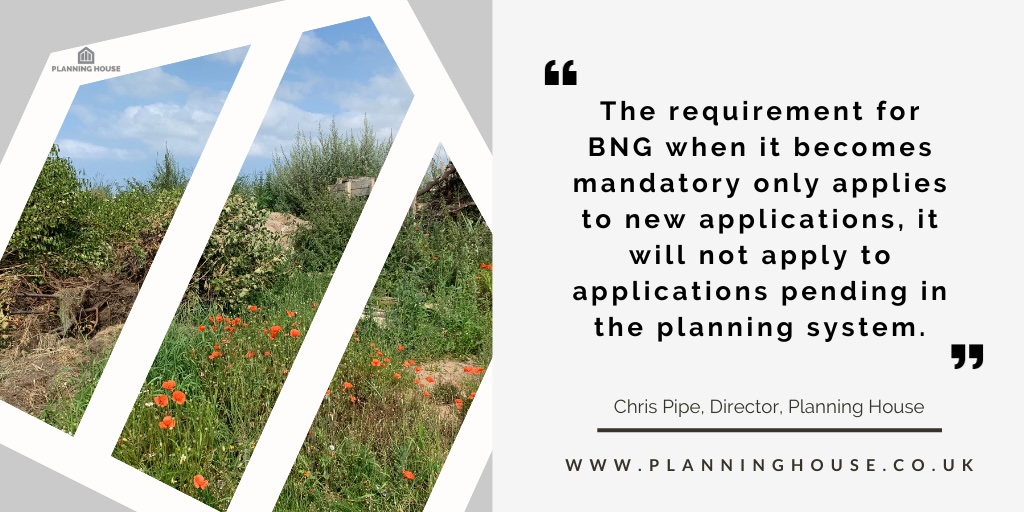In our article change to timeline for 10% biodiversity net gain becoming mandatory we drew readers attention to the fact that on the 29 November 2023 the Department for Levelling Up, Housing & Communities published the draft regulations and a suite of guidance relating to Biodiversity Net Gain (BNG).
The published material includes:
- the statutory metric tool
- draft regulations, covering:
- draft guidance, covering:
The legal requirement for a minimum biodiversity net gain (BNG) element will not take effect until the relevant regulations have been finalised and come into legal force. Which is due to go live 12 February 2024. Once in effect, the requirement will apply to new planning applications as outlined below, subject to the finalized details in the regulations:
- major development from 12 February 2024
- non-major development from 2 April 2024
- NSIPs from no later than November 2025
The requirement for BNG when it becomes mandatory only applies to new applications, it will not apply to applications pending in the planning system.
As of now, there are no established effective dates for the application of biodiversity net gain (BNG) requirements to retrospective planning applications or alternative permission pathways such as ground (a) enforcement appeals or local development orders.
Some categories of development will be exempt from meeting the legal minimum BNG standards, these are:
- Permitted development rights
- Householder applications
- Development which only has a ‘de minimis’ impact on habitats
- Developments undertaken for the purpose of fulfilling the BNG planning condition for another development
- High-speed railway network
- Certain self-build and custom build developments
The primary legislation establishing the statutory framework for biodiversity net gain (BNG) in England is principally set out in Section 90A and Schedule 7A of the Town and Country Planning Act 1990. This legislation was inserted by Schedule 14 of the Environment Act 2021 and has since been amended by the Levelling Up and Regeneration Act 2023 and the Biodiversity Gain (Town and Country Planning) (Consequential Amendments) Regulations [2023].
New legislation includes:
- The Biodiversity Gain (Town and Country Planning) (Modifications and Amendments) (England) Regulations 2024 (legislation.gov.uk)
- The Biodiversity Gain Requirements (Exemptions) Regulations 2024 (legislation.gov.uk)
- The Biodiversity Gain Requirements (Irreplaceable Habitat) Regulations 2024 (legislation.gov.uk)
- The Biodiversity Gain Site Register Regulations 2024 (legislation.gov.uk)
Under the statutory BNG framework, all grants of planning permission are deemed to have been issued subject to a standard biodiversity gain condition. This condition aims to secure at least a 10% gain in biodiversity value from pre-development baselines. This gain can be achieved through on-site improvements, registered off-site solutions, or biodiversity credits.
The biodiversity gain condition is a pre-commencement requirement. Once planning permission is granted, developers must submit and obtain approval of a Biodiversity Gain Plan before beginning construction. Exceptions and transitional provisions exist that exempt some permissions from this condition, as do specialised modifications for phased developments and treatment of irreplaceable habitats.
The government has created a dedicated BNG web page aimed at developers, local planning authorities, and land managers providing information you need for biodiversity net gain (BNG). This page consolidates all necessary information.
Related Contents
Our Practical guide to Biodiversity Net Gain highlights that In recent years, protecting the environment and promoting sustainable development practices have become greatly emphasised in town planning. By requiring developments to achieve at least a 10% increase in biodiversity value from pre-project baselines, Biodiversity Net Gain aims to meaningfully improve the environment even as growth continues. Its “net gain” approach supports sustainable construction that thoughtfully incorporates the needs of local ecosystems and species. Other articles we’ve published on this subject are:
- Biodiversity net gain: uk government introduces new measures
- Change to timeline for 10% biodiversity net gain becoming mandatory
Planning House work with some brilliant Ecologists and other consultants who could assist you in preparing your BNG plans for your development project, feel free to CONTACT US.


